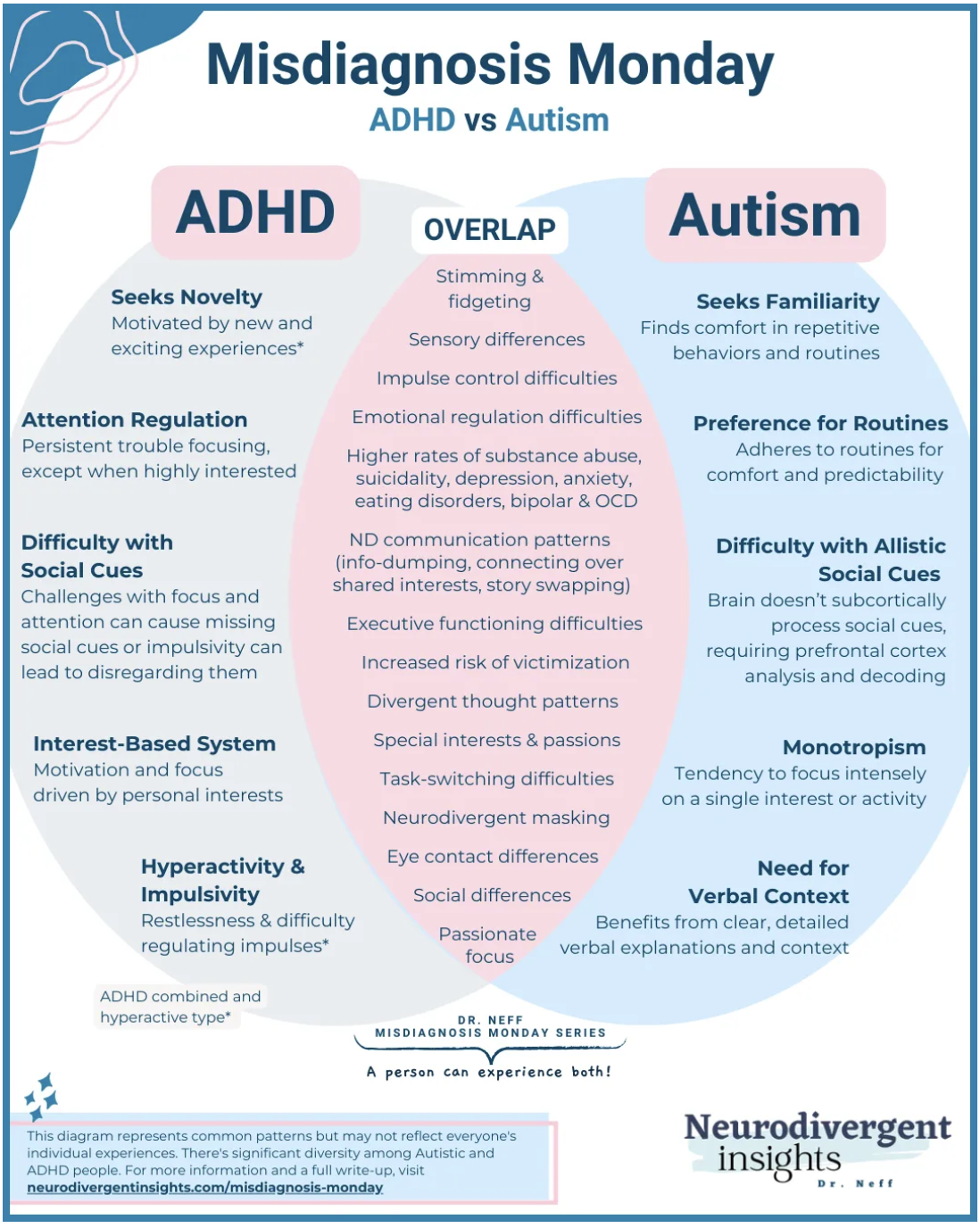ADHD Therapy In Los Angeles
Living with Attention Deficit Hyperactivity Disorder
If you feel like you’re always playing catch-up, forgetting tasks, or struggling to stay focused no matter how hard you try, you’re not alone. ADHD can make daily life feel overwhelming, affecting your work, relationships, and self-esteem. But with the right support, you can develop strategies that work for you. Our ADHD therapists in Los Angeles provide compassionate, evidence-based care to help you navigate challenges, build confidence, and take control of your life.
Getting Specialized Treatment Support for ADHD
At Sagebrush Psychotherapy, we know that ADHD is more than just difficulty paying attention—it’s a neurodevelopmental condition that impacts self-control, time management, emotional regulation, and personal relationships. Left untreated, ADHD can contribute to anxiety, low self-esteem, and struggles in school, work, and daily life. With the right ADHD treatment, you can develop behavioral strategies that allow you to thrive.
We take an evidence-based approach, offering cognitive behavioral therapy (CBT), Acceptance and Commitment Therapy, and other research-backed treatments tailored to your needs. Whether you're an adult with ADHD seeking coping skills or a parent navigating ADHD in your child, our therapy services help you understand ADHD and manage symptoms.
Understanding ADHD: Symptoms and Challenges
ADHD (Attention Deficit Hyperactivity Disorder) is a brain-based condition that affects focus, self-control, and daily life. It can make it hard to stay organized, complete tasks, and manage time. ADHD symptoms begin in childhood and often continue into adulthood.
Symptoms of ADHD
ADHD symptoms fall into two main categories: inattention and hyperactivity-impulsivity. Some people struggle with one type, while others experience both.
Signs of Inattention
Trouble staying focused on tasks, conversations, or reading.
Often forgets to follow instructions, leaving tasks unfinished.
Disorganized, making it hard to keep track of schedules, work, or belongings.
Avoids or struggles with tasks that require long periods of focus.
Loses things easily, such as keys, phone, or important papers.
Gets distracted easily by sights, sounds, or unrelated thoughts.
Often forgets appointments, deadlines, or daily responsibilities.
Signs of Hyperactivity & Impulsivity
Fidgets, taps, or has trouble sitting still for long periods.
Gets up when expected to stay seated, such as in class or meetings.
Feels restless or has difficulty staying quiet.
Always on the go, feeling like they need to be moving.
Talks too much, sometimes interrupting others.
Blurts out answers before a question is finished.
Has trouble waiting their turn, such as in lines or conversations.
Interrupts or intrudes on others' conversations or activities.
ADHD and Mental Health: Beyond the Executive Functioning Symptoms
Living with ADHD can deeply impact self-esteem, often starting in childhood and lasting into adulthood. Research shows that children with ADHD receive far more negative feedback than their peers—about 20,000 more corrective comments by age 12. Constant messages like “You’re not trying hard enough” or “Why can’t you just focus?” can lead to shame, self-doubt, and chronic self-criticism.
As they grow, many internalize failure, believing they are lazy or not good enough, rather than recognizing ADHD as a neurodevelopmental condition. Struggles with organization, time management, and follow-through make even daily tasks feel overwhelming, reinforcing feelings of inadequacy.
ADHD also affects social relationships. Impulsivity, inattentiveness, and difficulty reading social cues can lead to misunderstandings, loneliness, and disconnection from friends, colleagues, and partners.
Over time, these challenges increase the risk of anxiety, depression, and low self-worth. Learn more about the link between ADHD and depression here. When expectations feel impossible to meet, it’s easy to feel like a failure—but ADHD is not a personal flaw. It’s possible to build confidence and thrive.
ADHD Treatment in Los Angeles
1. Behavioral Therapy in ADHD Care
Behavioral therapy helps individuals with ADHD develop practical strategies to manage daily life challenges, such as staying focused, completing tasks, and improving impulse control. Sessions focus on things like:
Behavioral strategies for time management
Task initiation and follow-through
Environmental modifications
2. Dialectical Behavior Therapy (DBT) for Emotion Regulation
Many individuals with ADHD struggle with strong emotional reactions, frustration, and difficulty regulating mood. DBT skills help build emotional resilience and self-regulation strategies including:
Distress tolerance skills
Emotional awareness & regulation
Interpersonal effectiveness
3. Self-Compassion and Acceptance-Based Approaches
Many people with ADHD have internalized criticism and struggle with self-doubt. Therapy helps build self-acceptance and resilience using:
Acceptance and Commitment Therapy (ACT): Encouraging self-acceptance, mindfulness, and values-driven actions to shift focus from self-judgment to meaningful progress.
Reframing Perfectionism & Self-Criticism: Identifying unrealistic expectations, creating self-compassion practices, and celebrating small wins.
Shifting from shame to strength
4. Family Therapy & Support for Relationships
ADHD affects personal relationships, often leading to misunderstandings, frustration, and conflict. Family therapy helps loved ones understand ADHD symptoms, improve communication, and create supportive structures at home.
Parent Coaching for ADHD: Helping parents develop behavioral strategies to support children with ADHD while maintaining structure and emotional connection.
Relationship & Communication Skills: Teaching active listening, boundary-setting, and conflict resolution to reduce misunderstandings and improve relationships.
Managing Household Dynamics: Creating routines and expectations that support both individuals with ADHD and their family members.
5. Medication Management and Collaboration with Psychiatrists
For some individuals, medication can be an important part of ADHD treatment. While we do not prescribe medication, we can collaborate with psychiatrists and medical providers. By working together, we help clients integrate behavioral strategies, therapy, and medical support for a comprehensive approach to managing ADHD symptoms.
What do we mean by Neurodivergence?
Neurodivergence refers to brain differences that affect how people think, learn, and process the world. It includes conditions like ADHD, autism, dyslexia, and other neurological variations.
ADHD v. Autism
ADHD (Attention Deficit Hyperactivity Disorder) and Autism Spectrum Disorder (ASD) are both neurodevelopmental conditions, meaning they affect brain development and function. While they have distinct traits, they also share some overlapping characteristics.
Key Differences
ADHD is mainly defined by difficulty with focus, impulsivity, hyperactivity, and time management. People with ADHD often struggle with organization, completing tasks, and following routines. They tend to seek out stimulation and new experiences and may struggle with impulsive decision-making.
Autism primarily affects social communication, sensory processing, and preference for structure. Autistic individuals may have difficulty reading social cues, understanding unspoken rules, or adapting to change. Many prefer predictability and can become overwhelmed by sensory stimuli such as loud noises or bright lights.
Overlapping Traits
Despite their differences, ADHD and autism share several common experiences:
Emotional Regulation Challenges: Both conditions can make it difficult to manage strong emotions, frustration, and sensitivity to criticism.
Social Struggles: People with both ADHD and autism may misunderstand social cues, interrupt conversations, or struggle with relationships—though for different reasons. ADHD challenges often come from impulsivity, while autistic individuals may struggle with unspoken social norms.
Sensory Sensitivities: Both can involve sensory processing issues, such as discomfort with loud sounds, bright lights, or certain textures.
Difficulty with Transitions and Routines: ADHD makes it hard to stick to a routine, while autistic individuals often rely on structure and can feel distressed by unexpected changes.
Hyperfocus: While ADHD is often linked to distractibility, many with ADHD can also experience intense focus (hyperfocus) on topics of interest—something commonly seen in autism as well.
Some people are diagnosed with both ADHD and autism. Understanding the differences and similarities can help ensure that individuals receive the right support, strategies, and accommodations tailored to their unique needs.
ADHD in Women
Attention Deficit Hyperactivity Disorder (ADHD) has historically been underdiagnosed in women, leading to a gap in understanding its full impact across genders. Recent research has shed light on the unique challenges women with ADHD face, emphasizing the need for tailored approaches in diagnosis and treatment.
Symptom Differences and Diagnosis
Women with ADHD often show inattention, disorganization, anxiety, and depression rather than the hyperactivity commonly seen in men. These symptoms are less disruptive, leading to missed or delayed diagnoses. Many women also mask their struggles due to societal expectations to manage responsibilities efficiently, making ADHD harder to recognize.
Hormonal Influences on ADHD
Hormonal changes can worsen ADHD symptoms throughout a woman's life. Estrogen and progesterone fluctuations during the menstrual cycle impact focus and impulse control, with lower estrogen levels (early follicular and luteal phases) often making symptoms worse. Major hormonal shifts during puberty, pregnancy, and menopause can further affect ADHD symptoms, highlighting the need for treatment approaches that consider these changes.
Starting ADHD Therapy in Los Angeles
Struggling with Attention Deficit Hyperactivity Disorder (ADHD) can feel overwhelming. Whether you're dealing with difficulty staying focused, impulsivity, time management struggles, or the emotional toll of feeling misunderstood, our therapists are here to support you with mental health care tailored to your needs.
ADHD can impact self-esteem, personal relationships, work, and daily life, making even simple tasks feel like constant obstacles. Therapy can help you develop coping skills, build self-compassion, and learn behavioral strategies for treating ADHD more effectively. We take an evidence-based approach, considering underlying causes, medical history, and unique challenges to create a personalized treatment plan that works for you.
Our in-office therapy in Los Angeles and virtual sessions make it easier to seek treatment in a way that fits your life. Together, we’ll build a treatment plan that helps you manage ADHD, improve daily functioning, and create lasting change.









